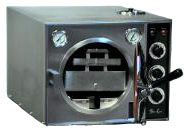|
COSMETOLOGY
04 Sanitation Requirements—General.
A. A full service beauty salon and a limited practice beauty salon
shall comply with the sanitation provisions in §B of this regulation.
B. Sanitation Provisions.
(11) Implements used in direct contact with a client shall be washed
in hot, soapy water before being immersed in a disinfectant solution
as specified in §B(12) of this regulation.
(12) Implements shall be disinfected in a wet sanitizer containing
an EPA-registered disinfectant effective against HIV and hepatitis
viruses, or a hospital-grade tuberculocidal disinfectant in a quantity
sufficient to cover those portions of the implements that come in
direct contact with a client.
(13) For each work station being used by a licensee or registrant,
a salon shall have:
(a) At least one wet sanitizer containing a disinfectant solution
as specified in §B(12) of this regulation; and
(b) At least one closed, dry drawer or cabinet which contains no objects
or substances other than those specified in §B(14) of this regulation.
(14) Cleaned and disinfected implements and equipment shall be stored
in a closed, dry cabinet or drawer which contains no other objects
or substances.
(21) An instrument that caused a skin abrasion or a cut to the skin
shall be cleansed and disinfected immediately. If bleeding occurs,
a tissue or cotton shall be used to collect the blood. Blood-contaminated
materials shall be disposed of immediately in a sealed, double-plastic
bag.
(25) Hot combs and curling irons shall be used in a well ventilated
area and wiped free of grease and hair with a paper towel or cloth
prior to their placement in the heater.
(26) A minimum of eight combs and four brushes shall be available
for each senior cosmetologist, cosmetologist, and cosmetologist apprentice.
(27) Protective neck strips or similar covering shall be used on each
client.
(28) Shampoo bowls shall be washed after each shampoo and sanitized
frequently with a disinfectant to assure cleanliness.
(29) Permanent waving retention rods shall be cleansed and sanitized
after each use. End papers shall be discarded immediately after use.
(30) Soiled combs, brushes, towels, or other used material shall be
removed from the tops of work stations immediately after use.
(31) Hair clips, hairpins, bobby pins, or similar implements may not
be placed in the mouth.
(32) Objects dropped on the floor may not be used until they are cleansed
and disinfected.
(33) Scissors, trimmers, clippers, and other implements which cannot
be immersed in a disinfectant shall be cleaned and sprayed with an
EPA-registered antimicrobial spray after each use.
06 Sanitation Requirements—Nail Technician Services.
A. In addition to the sanitation requirements in Regulation .04 of
this chapter, all establishments offering the services normally performed
by a nail technician shall comply with the requirements in §B
of this regulation.
B. Sanitation Requirements.
(1) Finger bowls, manicure bowls, pedicure spas, and foot bath basins
shall be disinfected after each client with:
(a) An EPA-registered disinfectant effective against HIV and hepatitis
viruses; or
(b) A hospital-grade tuberculocidal disinfectant.
(2) Oils used in a nail technology procedure shall be dropped onto
a properly disinfected hand with a glass or plastic dropper, and any
excess remaining after application shall be immediately discarded.
(3) The manicure table and surrounding areas shall be maintained in
a sanitary condition at all times.
(4) Table tops, armrests, footrests, and any other surface that the
client has physical contact with shall be disinfected after each client
with:
(a) An EPA-registered disinfectant effective against HIV and hepatitis
viruses; or
(b) A hospital-grade tuberculocidal disinfectant.
(5) A clean towel or disposable paper cover shall be placed over the
manicure cushion and footrest and changed before each client.
(6) An emery board or disposable file shall be discarded after its
use on a client.
(7) Except as provided in Regulation .04B(33) of this chapter, all
implements used by a nail technician shall be cleansed in hot, soapy
water and then immersed in a disinfecting solution as specified in
Regulation .04B(12) of this chapter before reuse.
(8) An EPA-registered disinfectant effective against HIV and hepatitis
viruses or a hospital-grade tuberculocidal disinfectant in a quantity
sufficient to cover those portions of the implements that come in
direct contact with the client shall be:
(a) Kept on the licensee's or registrant's table for contact disinfection
of implements that may come in contact with blood; and
(b) Changed immediately upon becoming dirty, cloudy, or contaminated
with blood.
(9) A complete set of manicuring implements shall be:
(a) Properly cleansed and disinfected, as specified in Regulation
.04B(12) of this chapter, after use on a client; and
(b) Stored in an air-tight container or a wet sanitizer containing
a disinfectant as specified in Regulation .04B(12) of this chapter.
(10) A sanitizable or washable file shall be properly disinfected,
as specified in Regulation .04B(12) of this chapter, after each use.
.05 Sanitation Requirements Estheticians.
A. In addition to the sanitation requirements in Regulation .04 of
this chapter, all establishments that offer the services normally
performed by an esthetician shall comply with the sanitation requirements
in § B of this regulation.
B. Sanitation Requirements.
(3) Lip color, eye color, shadows, or other cosmetics shall be removed
from the container by a spatula and applied to the client with a disposable
or cleansed and sanitized applicator.
(7) An EPA-registered disinfectant effective against HIV and hepatitis
viruses or a hospital-grade tuberculocidal disinfectant shall be:
(a) Kept on the esthetician tray for contact disinfection of implements
that may come in contact with blood; and
(b) Changed every 1 to 2 hours, or immediately upon becoming dirty,
cloudy, or contaminated with blood.
http://www.dsd.state.md.us/comar/subtitle_chapters/09_Chapters.htm#Subtitle22
http://www.dsd.state.md.us/comar/09/09.22.02.04.htm
 © ©
|



